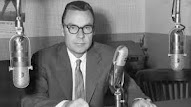In the episode, The Idea of Service . . .
“All of our income, tangible and psychic, of any kind, comes to us from making the best use of What We Are - as learning, growing, thinking, imagining, productive creatures in the service of others.”
Have you ever considered how the fate of one person has influenced your life for the better?
Allow me to introduce you to that person and how, through serving others, he changed the lives of countless millions.
Recently, as a volunteer for the Flying Leatherneck Aviation Museum, we launched an educational initiative on YouTube titled "The Inside Loop." Using the computer interface, Zoom, we can conduct interviews with retired U.S. Marines (in their homes) from World War II, the Korean War, and the Vietnam War.
This got me thinking about a former Marine who served during WWII on the USS Arizona, which was attacked on December 7, 1941, in Pearl Harbor. Killed were 1,177 of the 1,512 crewmen on board at the time; he was one of only 15 marines to survive the attack that day. His name is Earl Nightingale.
While in the Marine Corps, Earl was allowed to volunteer at the local radio station as an announcer. This is what eventually sparked his desire to move to Chicago and explore his newfound “broadcasting career.”
In Chicago, he began hosting his own daily commentary program on the huge, 50,000-watt clear channel, WGN radio. Earl's career spanned over 40 years, and from 1950 to 1996, he was known as the voice of the hero in the popular action-adventure series 'Sky King,' which also aired on WGN radio.
During that time, he authored a book, The Strangest Secret, which has been hailed as “one of the great motivational books of all time.”
He then went on to narrate this book in 1956. It was the first audio recording to achieve gold record status (over one million copies sold).
What captured my attention, as a young boy, was Earl Nightingale’s daily five-minute program, “Our Changing World,” which aired in 1959, five minutes a day, five days a week during that 40-year span. The program was heard on over a thousand radio stations, it was the most widely syndicated program of its time.
Subsequently, those five-minute segments would be compiled and distributed as a digital audio download, The Essence of Success.
I’ve made those segments a part of my life for over 55 years. So allow me to quote once again Earl's Idea of Service,
“All of our income, tangible and psychic, of any kind, comes to us from making the best use of What We Are - as learning, growing, thinking, imagining, productive creatures in the service of others.”
This is Patrick Ball. Thanks for listening. See you in the next episode.

Comments